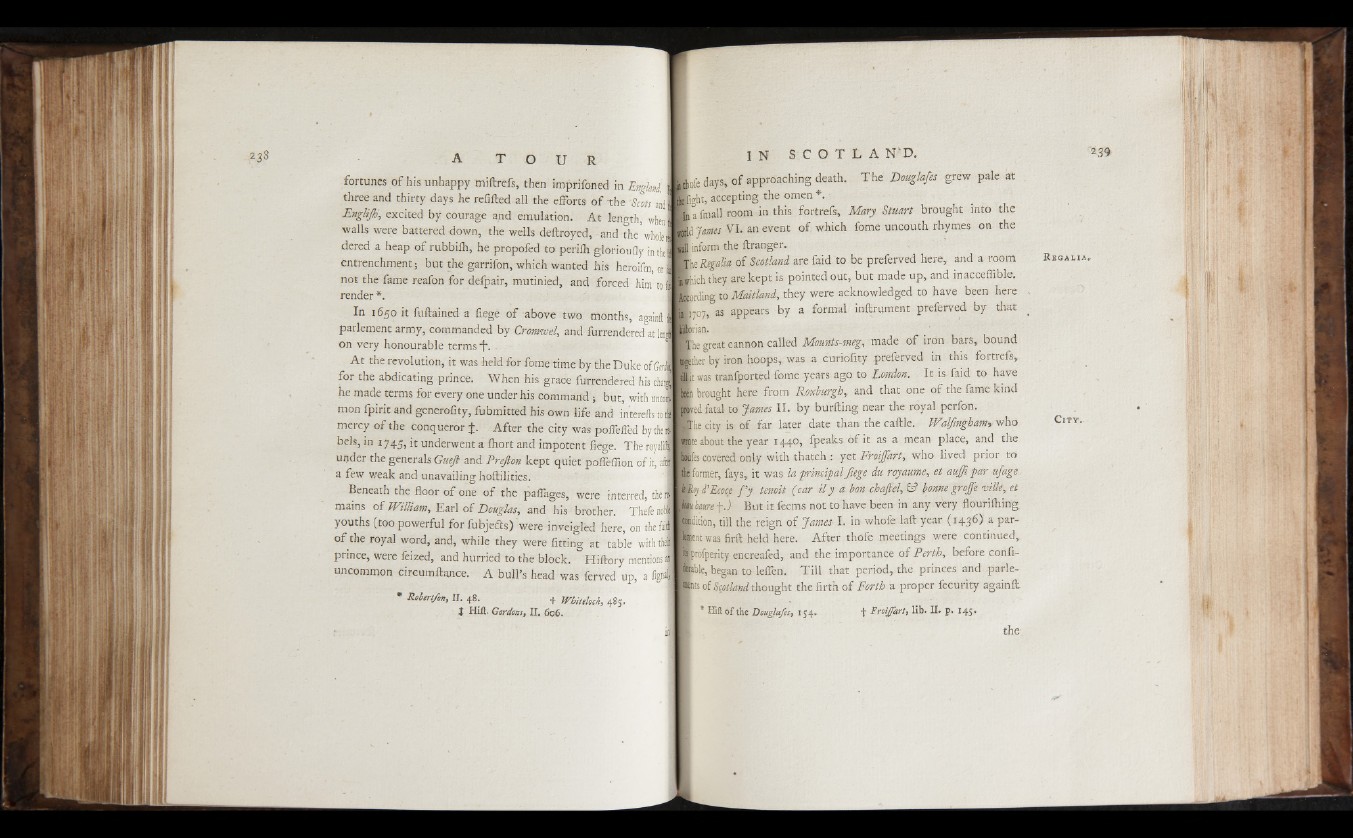
fortunes of his unhappy miftrefs, then imprifoned in England.
three and thirty days he refilled all the efforts of the Scots and]
EngliJH, excited by courage and emulation. At length, when!
walls were battered down, the wells deftroyed, and the wholt]
dered a heap of rubbilh, he propofed to perifh glorioully in del
entrenchment; but the garrifon, which wanted his heroifm, or]
not the fame reafon for defpair, mutinied, and forced him to 1
render *.
In 1 6 5 0 it fuftained a fiege of above two months, againft tk
parlement army, commanded by Cromwel, and furrendered at
on very honourable terms i*.
At the revolution, it was held for fome time by the Duke of C<J
for the abdicating prince. When his grace furrendered his d i|
he made terms for every one under his command ; but, w ith uncofl
mon fpirit and generality, fubmitted his own life and interefts toil
mercy of the conqueror $. After the city was polfelfed by the |
bels, in 1 7 4 5 , it underwent a ihort and impotent fiege. T h e ro yal!
under the generals Gueft and Prefton kept quiet poffeffion of it, J
a few weak and unavailing hollilities.
Beneath the floor of one of the pafiages, were interred, the
mams of William, Earl of Douglas, and his brother. Thefe noil
youths (too powerful for fubjefts) were inveigled here, on the fail
of the royal word; and, while they were fitting at table with tliel
prince, were leized, and hurried to the block. Hillory mentions al
uncommon circumltance. A bull’s head was ferved up, a fignJ
* Rolertfon, II. 48. + W hit,lock, 485.
J H iit Gordons, II, 606.
Hole days, of approaching death. The Douglafes grew pale at
¡height, accepting the omen *. - _
f | a fmall room in this fortrefs, Mary Stuart brought into the
world James VI. an event of which fome uncouth rhymes on the
111 inform t h e f t r a n g e r .
The Regatta of Scotland are faid to be preferved here, and a room
Ihich they are kept is pointed out, but made up, and inaccefiible.
Ilording to Maitland, they were acknowledged to have been here
jI7o7j as appears by a formal inftrument preferved by that
H tail.
jThe great cannon called Mounts-meg, made of iron bars, bound
EJther by iron hoops, was a curiofity preferved in this fortrefs,
iltwas tranfported fome years ago to London. It is faid to have
‘keen brought here from Roxburgh, and that one of the fame kind
proved fatal to James II. by burlting near the royal perfon.
Jrhe dty is of far later date than the caftle. Walfingham>• who
Bote about the year 1440,. fpeaks of it as a mean place, and the
houies covered only with thatch : yet FroiJJdrt, who lived prior to
[tlit former, fays, it was la principalJiege du royaume, et auffi par ufage.
pry i ’Ecoce f ’y tenoit (car ily a bon chafiel, 1/orne grojje mile, et
mbaure f J But it feems not to have been in any very flouriihing
■dition, till the reign of "James I. in whofe laft year (1436) a par-
kjientwas firft held here. After thofe meetings were continued,
itstprofperity encreafed, and the importance of Perth, before confi-
Spble, began to lefien. Till that period, the princes and parle-
Ijius of Scotland thought the firth of Forth a proper fecurity againil
* Hiit o f the Douglafes., 154- f Froijfart, lib. II. p. 14 5 ,
the
R e g a l i a .
C i t y .